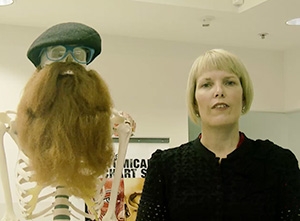Pozible joins superbug battle
Research news
Hip replacements are now fairly commonplace for the elderly, but they could become much more dangerous and much less common in the future as a result of super bugs.
Deakin microbiologist Dr Melanie Thomson has turned to crowdfunding in her mission to develop antimicrobial compounds - or antibiotics - that are effective against superbugs in joint replacement surgery.
Just a small contribution will help to get this project off the ground!
First identified about 15 years ago, super biofilms (one type of super bug infection) are groups of bacteria that have evolved the ability to cluster together to work as a multi-cell organism that is highly resistant to antibiotics and immune systems.
“Poor drug stewardship in medicine and agriculture means that each year we are seeing more and more people developing superbug infections in their hip implants,” Dr Thomson said.
“These infections can lead to secondary problems, such as infected heart valves, or patients unable to have revision surgery, so they are left with no hips, and they can be fatal.”
Through the Research My World crowdfunding venture between Deakin and Pozible.com, Dr Thomson and colleagues from Deakin and Barwon Health believe that only $11,700 will be enough to help them develop new antibiotics that are both effective against superbugs and harmless to the bone-forming cells needed for bone grafting and healing of the new implants.
"The hips are particularly vulnerable to superbugs because the hip implant is pushed down a channel into the femur, where bacteria can form a layer between the bone and the implant, called a 'sinus tract,' which is especially difficult to treat,” Dr Thomson said.
She explained that general surgery also has the same risks for acute infections, but it is the formation of the biofilm on an implant that can persist for many years, leading to chronic pain and the risk of bacteria spreading from that site to a secondary site, like a heart valve graft.
“The superbugs can multiply every 20 minutes, which means they can evolve rapidly and they are very good at picking up useful bits from other bacteria... like the genes for antibiotic resistance.”
While the incidence of infections from super bugs may rise, Dr Thomson said that of most concern is the rise in numbers of the elderly as a result of Australia’s demographically ageing population.
“The trend towards obesity in the population also means joints will wear out sooner and need replacing earlier in someone's life span, increasing the risk of long-term problems,” she said.
“It is widely acknowledged that the major drug companies are not very interested in putting the billions of dollars needed towards the research and development of these drugs, as the risk of the superbugs rapidly evolving resistance mechanisms is high. This would affect the return on investment for their shareholders and is not their business model.
“Producing large quantities for human consumption will always have to be carried out by drug companies after 15 years of pre-clinical and clinical trials.
“However, by identifying new compounds - with the help of my chemical engineering collaborators - we can complete the first step in this process. If we are successful in our laboratory models, by having reduced the costs and risk for the commercial companies, we may be able to get one of the companies interested enough to take any promising compounds to further development.”
Share this story
 Dr Melanie Thomson
Dr Melanie Thomson
